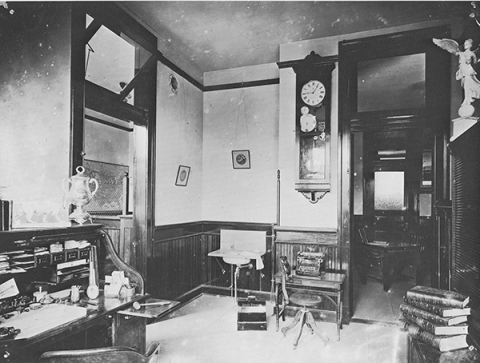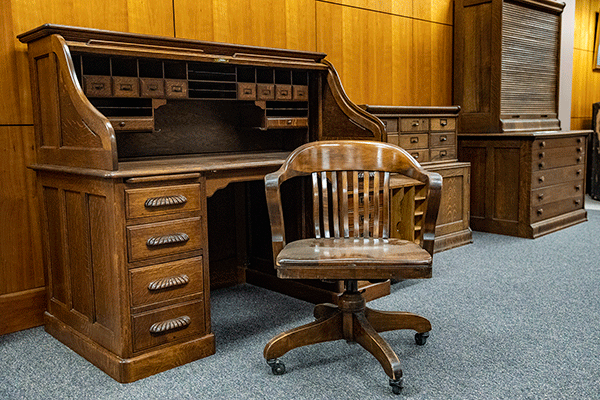Dr. Edwin Lewis Stephens’ desk “stuck out like a green thumb.”
Susan Richard knew she had muddled metaphors – but describing the avocado color that once coated the rolltop used by the University of Louisiana at Lafayette’s first president required some linguistic license.
Displayed alongside other furniture from Stephens’ office in Edith Garland Dupré Library’s Jefferson Caffery Reading Room, the desk looked nothing like the chair, shelves and card file that completed the set. Those pieces remained their original golden oak color, while the desk’s hue might best have been described as guacamole.
Who painted the desk green, and when, are details lost to history, but the “green thumb” was an historical sore spot nevertheless, said Richard, interim dean of University Libraries.
“We needed to bring the desk back to the way it was originally, especially to match the other furniture,” she said.
Enter George Parker, owner of Parker Woodworks & Furniture Repair in Lafayette. He and a crew of restorers spent nearly a year painstakingly returning the desk to a condition that even Stephens might recognize.
That required removing, by hand, several layers of coating, glazing and paint before the desk’s original shellac finish was exposed. That layer came off, too. Only then did Parker and his team begin restoring the rolltop’s original finish.
But the process wasn’t quite that cut and dyed, Parker said. “There are plenty of complications that go along with restoring a piece like Dr. Stephen’s desk.”
For instance, someone – again, who, when and why are mysteries – had replaced the desk’s locking mechanism with screws. Its tambour, the cylindrical cover that gives the rolltop its roll, was sealed shut.
“For all we knew, there could have been bearer bonds or gold or anything inside that desk,” Parker said with a chuckle.
There weren’t. When opened, though, the tambour unveiled cubbies, small drawers, nooks and stacked compartments. During Stephens’ tenure, they would have been filled with correspondence from prospective and current students, parents, notes from state and community leaders, reports from faculty and other documents.
The opened tambour also revealed “a lot of the original color inside the desk,” which had been spared the painter’s brush, Parker said. “That’s how we knew what color we needed to make it. Plus, we had Dr. Stephen’s desk chair, and it was the original color.”
Restoring the tambour itself was a “meticulous” task, he added. The cover gets its crescent shape from its ability to bend, but that meant green paint had seeped into the crevasses. “We don’t have some magic tank where we dip this thing and it comes out free of paint,” Parker explained. “It’s got to be done by hand with a brush and some mild paint stripper.”
Rolltop desks were mainstays in late 19th and early 20th century offices. Abundant storage space enabled easy access to documents. In addition, Stephens’ desk was outfitted with a swiveling turret that concealed more filing space and compartments.
It’s a distinctive feature, Parker said. “It’s the only one I’ve ever seen.”
The desk retains clues to its workhorse status in the president’s office. One drawer holds an alphabetized file index. Others contain handwritten notations on labels that indicate when files were removed and returned.
The earliest date, May 16, 1905, enables an approximation of when Stephens purchased the desk from its maker, Moon Desk Co. in Muskegon, Michigan.
That was five years into Stephens’ long tenure as president of Southwestern Louisiana Industrial Institute. He oversaw the school’s name change to Southwestern Louisiana Institute in 1921 and remained president until 1938.
Whether he used the desk throughout that period isn’t clear, though it is unlikely.
As the institution gained students, and paperwork and correspondence increased, the desk would have become less functional. In fact, rolltop desks began to fall out of favor as the 20th century progressed; they just couldn’t keep up with increasing demands of modern office life.
In 1905, Southwestern had roughly 200 students and about 15 faculty. In 1938, the last year of Stephens’ tenure, 2,100 were enrolled and the faculty included 100 members.
The desk reminds viewers of the University’s modest beginnings, said Zachary Stein, head of Special Collections.
Now fully restored, it’s returned to the Jefferson Caffery Reading Room where it sits alongside other pieces of Stephens’ office set and within feet of parlor furniture and a trunk that belonged to the library’s namesake. Edith Garland Dupré was among the first eight faculty members Stephens hired.
Collectively, the pieces “take a person back to the early days of the University,” Stein said.
“Our main goal is to be able to preserve these artifacts so students and visitors can get an idea of what the faculty and administration used back then, and where we’ve come from as an institution.”

Top photo caption: Dr. Edwin Lewis Stephens’ newly restored rolltop desk is on display alongside other furniture from the founding president’s office in Edith Garland Dupré Library’s Jefferson Caffery Reading Room. (Photo credit: Rachel Rafati / University of Louisiana at Lafayette)
Bottom photo caption: Dr. Edwin Lewis Stephens’ desk is seen in the left corner of this undated archival photo of the president’s office. (Photo courtesy of UL Lafayette Special Collections)
